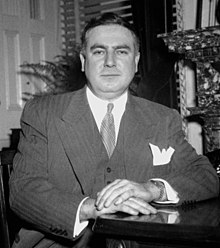
Back براين مكمان Arabic برين مكماهون ARZ برین مکماهون AZB Brien McMahon German برین مکماهون FA Brien McMahon French Brien McMahon Hungarian Brien McMahon ID Brien McMahon Swedish
Brien McMahon | |
|---|---|
 McMahon in 1945 | |
| Chair of the Joint Atomic Energy Committee | |
| In office January 3, 1949 – July 28, 1952 | |
| Preceded by | Bourke B. Hickenlooper |
| Succeeded by | Carl T. Durham (Acting) |
| In office August 1, 1946 – January 3, 1947 | |
| Preceded by | Himself (Senate Atomic Energy Committee) |
| Succeeded by | Bourke B. Hickenlooper |
| Chair of the Senate Atomic Energy Committee | |
| In office October 22, 1945 – August 1, 1946 | |
| Preceded by | Position established |
| Succeeded by | Himself (Joint Atomic Energy Committee) |
| Secretary of the Senate Democratic Caucus | |
| In office January 3, 1945 – July 28, 1952 | |
| Leader | Alben W. Barkley Scott W. Lucas Ernest McFarland |
| Preceded by | Francis T. Maloney |
| Succeeded by | Thomas C. Hennings Jr. |
| United States Senator from Connecticut | |
| In office January 3, 1945 – July 28, 1952 | |
| Preceded by | John A. Danaher |
| Succeeded by | William A. Purtell |
| Personal details | |
| Born | James O'Brien McMahon October 6, 1903 Norwalk, Connecticut, U.S. |
| Died | July 28, 1952 (aged 48) Washington, D.C., U.S. |
| Political party | Democratic |
| Education | Fordham University (BA) Yale University (LLB) |
| Signature |  |
Brien McMahon (born James O'Brien McMahon) (October 6, 1903 – July 28, 1952) was an American lawyer and politician who served in the United States Senate (as a Democrat from Connecticut) from 1945 to 1952. McMahon was a major figure in the establishment of the Atomic Energy Commission, through his authorship of the Atomic Energy Act of 1946 (the McMahon Act).
McMahon served as chairman of the Senate Special Committee on Atomic Energy, and the first chairman of the Joint Committee on Atomic Energy. McMahon was a key figure in the early years of atomic weapons development and an advocate for the civilian (rather than military) control of nuclear development in the USA. Also, in 1952, McMahon proposed an "army" of young Americans to act as "missionaries of democracy", which sowed the seeds for what later became the Peace Corps.